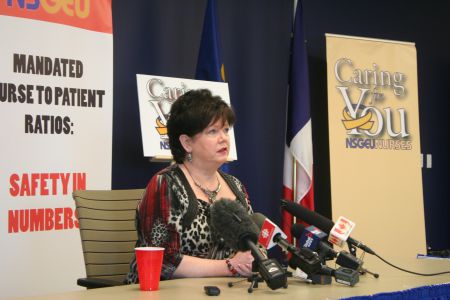K'JIPUKTUK (Halifax) - A strike at hospitals in the Halifax area is becoming more likely now that negotiations between Capital District Health Authority and the Nova Scotia Government and General Employees Union (NSGEU) have reached an impasse.
The local will be in a legal strike position on April 3rd.
But a strike could happen even earlier.
"When [back-to-work] legislation is brought in we will go out on the next shift," said Joan Jessome, President of the NSGEU, today at a press conference in Burnside.
"I certainly got the loud and clear direction from the nurses. They are telling us that their voices are not going to be silenced if legislation is brought in," Jessome said.
Jessome believes that the Liberal majority government will bring in essential services legislation, just as it did in late February when home support workers threatened to walk off the job.
The nurses are asking that mandatory nurse-to-patient ratios be phased in, arguing that too often the nurses are working understaffed, putting patients' health and even lives at risk.
"We cannot and we will not stand idly by and be silent and not try to improve nurses' working conditions," Jessome said. "We have a moral responsibility. This is not just a bargaining issue. This is a life and death issue."
"What [Liberal Premier] MacNeil is trying to do is silence the nurses and bring in legislation so that they have no ability to address anything around patients in the future."
Resignation also remains an option if back-to-work legislation is introduced, Jessome said.
But nurses will continue to provide emergency care in case of a strike.
A press release by the NSGEU states that nurses have committed to fuly staff the Emergency room, ICUs, veterans' care, hemodialysis and cancer care, as well as provide basic coverage in many other areas. That includes organ transplants as well, Jessome adds.
Patients' safety is the number one issue for the nurses.
"Nurses have told us over and over again what their workday is like," said Jessome. "They aren't able to provide safe care, they do not have adequate staffing, their stories are heart wrenching."
"We're looking at 125 nurses that would be needed," said Jessome."
"It is not 800 nurses, it is not 60 million dollars," Jessome added, contradicting claims by Capital Health.
Lives could be saved if understaffing were not such an endemic problem, nurses say.
Capital Health staff filed 40,000 Patient Safety Reports over the last two years.
A summary report suggests that three per cent of the affected patients suffered severe harm, or even death, because something was amiss. That amounts to 600 patients each year.
But the real number is likely much higher. Many accidents go unreported.
"Many nurses have given up on the safety reports. Thye don't see anything change as a result of submitting the reports," Robert Chisholm, a Registered Nurse who works in an Intensive Care Unit, told the Halifax Media Co-op.
Some nurses even feel initimidated by management when they submit an accident report, said Trish MacDonald, another Registered Nurse.
"It ends up being turned around, it's suggested that you didn't do enough to prevent the accident."
Capital Health has argued that there already is a process to deal with issues such as understaffing. And that process just needs tweaking.
Chisholm and MacDonald don't think so.
"We have tried to use those quality care reports for the last 16 years, but they have never resulted in any kind of change," said Chisholm.
"On some floors, people have been reprimanded [for submitting a quality care report]," added Macdonald. "Staff are told, if you had time to fill out that form, it could not have been that bad."
"The nurses are going to have a voice with Capital Health when it comes to patient safety," said Chisholm. "And we are wiling to do whatever is necessary."
"It's not a monetary issue this time, it is about patient safety and working conditions. As much as we don't like to go on strike, we're going for it. And we're tenacious."
See also: California nurses have no regrets about mandatory nurse-to-patient ratios
Follow Robert Devet on Twitter @DevetRobert



